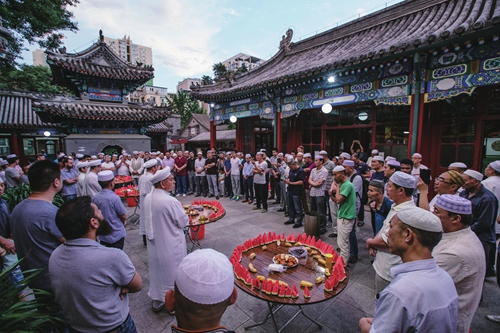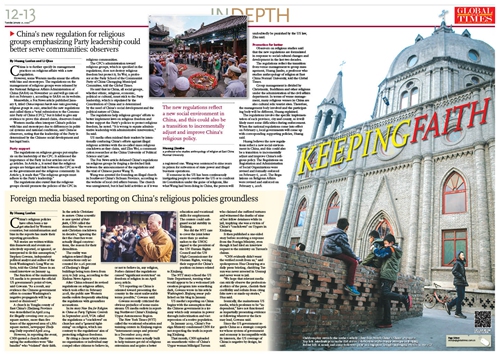HOME >> CHINA
Foreign media biased reporting on China’s religious policies groundless
By Huang Lanlan Source:Global Times Published: 2020/1/20 21:18:40

A monk and some believers pray at Longquan Temple in Beijing. Photo: Li Hao/GT
China's religious policies have often been a target attacked by Western countries, but misinformation and bias in the reports has made their reporting groundless."All stories are written within this framework and events are selectively reported, or ignored, or interpreted to fit this assumption," Stephen Gowans, independent political analyst and author of the book Washington's Long War on Syria, told the Global Times in an email interview on January 14.
The function of the mainstream US media is to present the official US government's point of view, said Gowans. "As a result, any evidence the Chinese government offers to counter Washington's negative propaganda will be ignored or dismissed."
A church in Yongjia county of East China's Zhejiang Province was demolished in April 2014 for illegally covering over 10,000 square meters, more than five times of the approved area of 1,881 square meters, newspaper Zhejiang Daily reported April 2014.
However, in reporting the event, CNN quoted a church staffer saying the authorities were "like bandits" who "violated" their faith. In the article Christians in eastern China scramble to save symbol of their faith, CNN called the demolition "the worst anti-Christian crackdown in decades," ignoring the fact the churches were actually illegal constructions, the reason for their demolition.
The reality was religion-related illegal constructions only accounted for 0.26 percent of Zhejiang's illegal buildings being torn down from 2013 to July 2014, according to the Xinhua News Agency.
After China released its revised regulations on religious affairs, which took effect in February 2018, the public saw Western media outlets frequently attacking the regulations with groundless accusations.

Muslims pray in the Eid al-Fitr celebration at the Niujie Mosque in Beijing. Photo: Li Hao/GT
In its story New Era for Religion in China as Party Tightens Controls in September 2018, VOA called the regulations a "crackdown" on churches and a "general tightening" on religion, which ran contrary to the regulations' aim of protecting religious freedoms.
By citing a clause which states no organization or individual may compel other citizens to believe in, or not to believe in, any religion, Forbes claimed the regulations caused "significant restriction" on freedom of religion in an April 2019 article.
"US reporting on China is oriented toward presenting the country in the most unfavorable terms possible," Gowans said.
Gowans recently criticized the obvious prejudice of some mainstream US media outlets in reporting Northwest China's Xinjiang Uygur Autonomous Region.
The New York Times (NYT) called the vocational education and training centers in Xinjiang region "internment camps and prisons" in a December 2019 story.
The centers were actually built to help trainees get rid of religious extremism and acquire a better education and vocational skills for employment. The centers could safeguard social stability in Xinjiang.
Nor did the NYT care to cover the joint letter more than 50 ambassadors to the UNOG signed to the president of the UN Human Rights Council and the UN High Commissioner for Human Rights, voicing their support for China's position on issues related to Xinjiang.
The NYT story echoed the US State Department, turning what would appear to be a welcomed job creation program into something dark, Gowans wrote in his article Washington's Xinjiang smear published on his blog in January.
US media's reporting on China begins with the assumption that the Chinese government is a tyranny which only remains in power through indoctrination and vast repression of a restive population.
In January 2019, China's Foreign Ministry condemned CNN for not respecting the truth in reporting Xinjiang.
That month, CNN uploaded an unauthentic video of China's Uygur woman Mihrigul Tursun who claimed she suffered tortures and witnessed the deaths of nine of her fellow detainees while in jail, implying she was a victim of China's "crackdown" on Uygurs in Xinjiang.
It then published a one-sided story before receiving a response from the Foreign Ministry, even though it had filed an interview request to the ministry on Tursun's claims.
"CNN evidently didn't want the verified result from us," said spokesperson Hua Chunying at a daily press briefing, clarifying Tursun was never arrested in Urumqi and never went to jail.
"We hope that relevant media can strictly observe the professional ethics of the press, cherish their credibility and refrain from citing fake news or made-up stories," Hua said.
Ironically, the mainstream US media, which professes to be "independent," have not functioned as impartially presenting evidence or following wherever the facts may lead, Gowans said.
Since the US government regards China as a strategic competitor whose system of government and economy is incompatible with its interests, the US coverage of China is negative by design, he said.

RELATED ARTICLES: